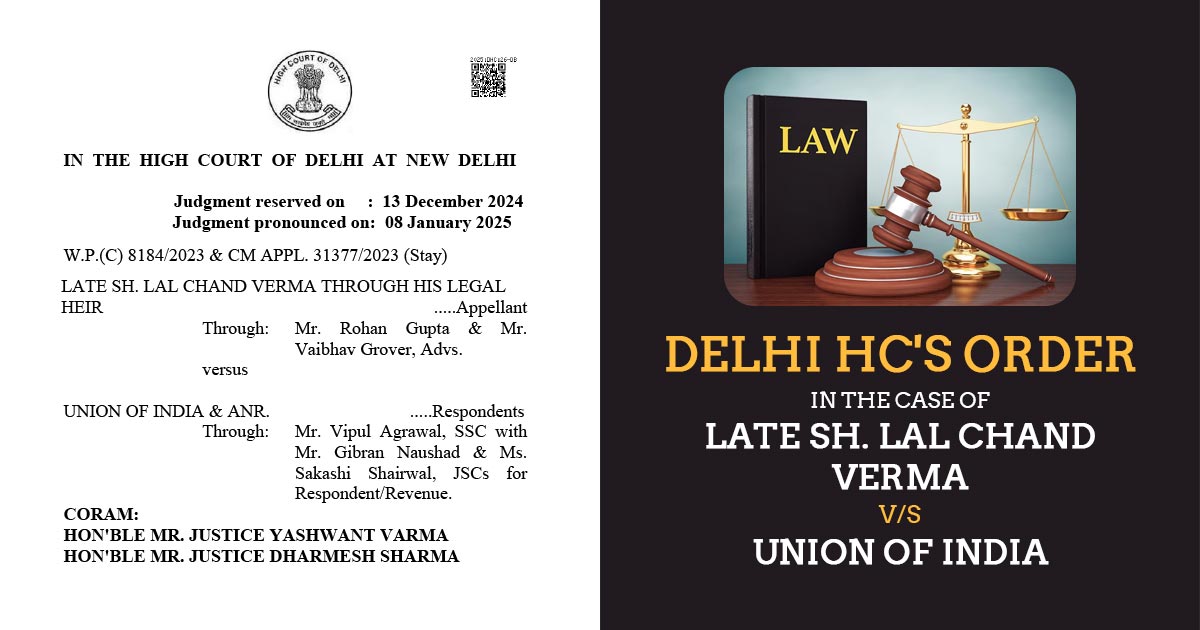
The Delhi High Court, Section 159 of the Income Tax Act can be invoked to move against the legal representative of a taxpayer, only in cases where the reassessment notice was issued to the taxpayer during his lifetime, not after.
The provision makes the legal representative (if alive) of the deceased person obligated to pay any sum that is due and is to be paid by the deceased.
Read Also: Delhi HC: Section 153C of IT Act Requires AO’s Satisfaction, Not Tax Portal Uploads
Under Sub-section (2) it cites that any proceeding taken against the deceased before his death would be considered to have been taken against the legal representative and may be continued against the legal representative from the phase at which it stood on the death date of the deceased.
In July 2021 the taxpayer passed away but the reassessment notice was furnished in his name only in March 2023.
If the son of the deceased taxpayer told the department about his father’s demise then the latter passed a reassessment notice u/s 148 considering the financial transactions of Rs 14,55,000 as the deceased taxpayer’s taxable income for the pertinent assessment year.
Thereafter the son moved the HC quoting Savita Kapila v. Assistant Commissioner of Income Tax (2020) whereby the Division Bench of the High Court dealt with identical circumstances where a reassessment notice was issued to a dead person. It was ruled therein,
“The sine qua non for acquiring jurisdiction to reopen an assessment is that notice under section 148 should be issued to a correct person and not to a dead person. Consequently, the jurisdictional requirement under section 148 of the Act, 1961 of service of notice was not fulfilled in the present instance.”
Recommended: SC Overturns HC Order on Section 148A(b) Notice to Deceased, Shifts Onus to Legal Representatives
While the department asked to invoke section 159 arguing that the defect in the notice is curable and notice to a statutory heir is not poor in law.
At the outset, the division bench of Justices Yashwant Varma and Dharmesh Sharma observed that “Section 159 of the Act is applicable when proceedings are initiated and pending against an assessee during their lifetime, and the legal representative assumes responsibility after the assessee’s death.”
In the present case, the Court ruled that the same was not the factual scenario hence Section 159 of the Act is not applicable here.
It was outlined by the Delhi High Court that no notice had been issued to the legal heir of the deceased u/s 159(2)(b) of the Act, despite the Department being notified of the death.
“We may also refer to decision of this Court in Dharamraj (supra), wherein also the assessee had died much prior to the issuance of the notice under Section 148 of the Act, and the issuance of such a notice was held to be unsustainable in law, inter-alia holding that even section 292B 6 of the Act does not apply in such a situation,” Court articulated and quashed the reassessment proceedings.
| Case Title | Late Sh. Lal Chand Verma vs. Union of India |
| Citation | W.P.(C) 8184/2023 & CM APPL. 31377/2023 |
| Date | 08.01.2025 |
| Appellant By | Mr. Rohan Gupta & Mr. Vaibhav Grover |
| Respondent By | Mr. Vipul Agrawal, Mr. Gibran Naushad & Ms. Sakashi Shairwal |
| Delhi High Court | Read Order |